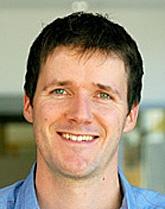
Matthias Peter Machner, Ph.D.
Senior Investigator
Section on Microbial Pathogenesis
NICHD/DIR
Research Topics
Uncovering Virulence Mechanisms of the Intracellular Pathogen Legionella pneumophila
Infectious diseases have remained a leading cause of death worldwide, especially in young children, particularly in low-income countries. Obtaining a detailed understanding of the underlying virulence mechanisms is of fundamental importance for the development of novel therapeutic approaches to more effectively treat or prevent infectious diseases.
The bacterium Legionella pneumophila is the causative agent of a life-threatening pneumonia called Legionnaires' disease. This respiratory disease is most prevalent in developed countries like the U.S. Upon entering alveolar macrophages, L. pneumophila deliver a large number of bacterial proteins, or effectors, into the host-cell cytosol (Fig. 1). Those effectors help L. pneumophila to manipulate host cell signaling and trafficking processes, thereby establishing a camouflaged compartment, the Legionella-containing vacuole (LCV). The main focus of our laboratory is to identify and characterize host-pathogen interactions during L. pneumophila infection and to determine their importance for bacterial virulence.
Biography
Dr. Matthias P. Machner graduated from the German college Gymnasium Carolinum of Osnabrueck in 1991. He obtained his Diploma in Biology in 1998 after working with Dr. Hildgund Schrempf at the University of Osnabrueck. Dr. Machner received his Ph.D. degree in Life Sciences (Dr. rer. nat.) from the Carolo Wilhelmina University of Braunschweig, Germany in 2002, graduating with highest distinction (summa cum laude). He then moved to Boston, Massachusetts, where he pursued postdoctoral studies with Dr. Ralph R. Isberg at Tufts University School of Medicine. In 2008, Dr. Machner accepted a tenure-track investigator position in the Cell Biology and Metabolism Program as Head of the Unit on Microbial Pathogenesis which has been committed to deciphering the molecular mechanisms underlying Legionnaires’ disease, a severe pneumonia caused by the bacterium Legionella pneumophila. Since approval of his tenure in 2016, Dr. Machner’s has continued his work on L. pneumophila virulence strategies. His laboratory recently made the discovery that several signaling route best known for their importance in tissue development as well as tumorigenesis also play unexpected roles during infection by L. pneumophila. He showed that the human Hippo pathway, which regulated organ size during human development, is the target of a Legionella kinase. He also discovered that the proto-oncoprotein NRas is hijacked by the pathogen to alter signaling along the MAPK (mitogen-activated protein kinase) pathway involved in innate immunity. More recently, his team developed a novel genetic tool that harnesses the power of CRISP interference for gene silencing in Legionella, thus identifying novel genes that are critical for bacterial virulence.
Selected Publications
- Lehman SS, Williamson CD, Tucholski T, Ellis NA, Bouchard S, Jarnik M, Allen M, Nita-Lazar A, Machner MP. The Legionella pneumophila effector DenR hijacks the host NRas proto-oncoprotein to downregulate MAPK signaling. Cell Rep. 2024;43(4):114033.
- Ellis NA, Myers KS, Tung J, Davidson Ward A, Johnston K, Bonnington KE, Donohue TJ, Machner MP. A randomized multiplex CRISPRi-Seq approach for the identification of critical combinations of genes. Elife. 2023;12.
- Li X, Anderson DE, Chang YY, Jarnik M, Machner MP. VpdC is a ubiquitin-activated phospholipase effector that regulates Legionella vacuole expansion during infection. Proc Natl Acad Sci U S A. 2022;119(48):e2209149119.
- Lee PC, Machner MP. The Legionella Effector Kinase LegK7 Hijacks the Host Hippo Pathway to Promote Infection. Cell Host Microbe. 2018;24(3):429-438.e6.
- Neunuebel MR, Chen Y, Gaspar AH, Backlund PS Jr, Yergey A, Machner MP. De-AMPylation of the small GTPase Rab1 by the pathogen Legionella pneumophila. Science. 2011;333(6041):453-6.
Related Scientific Focus Areas

Microbiology and Infectious Diseases
View additional Principal Investigators in Microbiology and Infectious Diseases


Molecular Biology and Biochemistry
View additional Principal Investigators in Molecular Biology and Biochemistry
This page was last updated on Monday, January 5, 2026